Claude Forthomme's Blog, page 16
April 13, 2016
FISH FARMING: A WAY TO ADAPT TO CLIMATE CHANGE?
Another one of my articles on Impakter:

FARMING IN WATER: THE CHALLENGES OF AQUACULTURE
CLAUDE FORTHOMMEon April 13, 2016 at 9:00 AMA Conversation with Michael New, World Expert on Freshwater Prawn Farming and Founder of Aquaculture without Frontiers (AwF)For a long time, aquaculture was the foster child of agriculture, but now it has come of age: output has more than tripled over the past 20 years, making it the world’s fastest-growing food producing sector.After the conquest of land, farming is conquering water, a much greater challenge.With a production close to 80 million tons annually, fish farming provides the world with 17 percent of its animal protein. The lion’s share of aquaculture production, some 90 percent, comes from developing countries, and while most fish farms are in Asia, aquaculture’s highest growth rates have of late been in Africa and South and Central America.THE FISH FARMING REVOLUTIONDeveloping countries get more revenue from farmed fish exports than from meat, tobacco, rice and sugar combined. China however, remains the big player, exporting over twice as much in value terms as Norway that clocks in second.But rankings are shifting with new entrants. In 2014, Thailand, historically the world’s third-largest exporter of fish products, was surpassed by Vietnam, thanks to the rapid market acceptance of itspangasius production, a freshwater white fish that competes successfully with sea-based speciessuch as cod and the freshwater channel catfish produced in the Americas.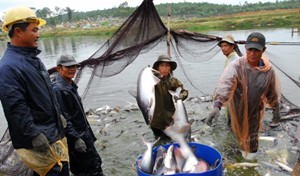 Fish farming is fast becoming big business and fish trade requires regulation more than ever to reassure consumers. According to Audun Lem, Deputy-Director in FAO’s Fisheries Policy Division, one reason aquaculture has surged ahead of open-sea fishing is that its production methods are typically “far less seasonal and volatile.” This allows for easier access to insurance or credit – for example, there are now salmon futures – and even “tailored solutions” such as the production of fattier salmon better adapted for smoking.
PHOTO
: (ABOVE) PANGASIUS HARVEST – VIETNAM. SOURCE: VIETNAM PANGASIUS ASSOCIATION.As aquaculture production becomes more reliable, longer-term investmentS can be made in a number of innovative techniques such as selective breeding, cold-storage facilities and methods to minimize fish waste. This opens the way for “fewer but larger operators,” a process well advanced with species such as marine shrimp, tilapia, Atlantic salmon and European sea bass and bream.An example of one such large operator is Sino Agro Food, inc., an American company operating in China. It is currently establishing mega farms in China to meet the demands of the Chinese middle class, estimated to be around 500-600 million; one project in particular, in Zhongshan, is unprecedented in size and scope, the largest fish farm in the world, covering some 600 acres and using the most advanced water-recycling technology.
Fish farming is fast becoming big business and fish trade requires regulation more than ever to reassure consumers. According to Audun Lem, Deputy-Director in FAO’s Fisheries Policy Division, one reason aquaculture has surged ahead of open-sea fishing is that its production methods are typically “far less seasonal and volatile.” This allows for easier access to insurance or credit – for example, there are now salmon futures – and even “tailored solutions” such as the production of fattier salmon better adapted for smoking.
PHOTO
: (ABOVE) PANGASIUS HARVEST – VIETNAM. SOURCE: VIETNAM PANGASIUS ASSOCIATION.As aquaculture production becomes more reliable, longer-term investmentS can be made in a number of innovative techniques such as selective breeding, cold-storage facilities and methods to minimize fish waste. This opens the way for “fewer but larger operators,” a process well advanced with species such as marine shrimp, tilapia, Atlantic salmon and European sea bass and bream.An example of one such large operator is Sino Agro Food, inc., an American company operating in China. It is currently establishing mega farms in China to meet the demands of the Chinese middle class, estimated to be around 500-600 million; one project in particular, in Zhongshan, is unprecedented in size and scope, the largest fish farm in the world, covering some 600 acres and using the most advanced water-recycling technology.

... To read the rest, click here. I believe aquaculture is one of the solutions when climate change hits and normal farming goes under stress, let me know what you think!




FARMING IN WATER: THE CHALLENGES OF AQUACULTURE
CLAUDE FORTHOMMEon April 13, 2016 at 9:00 AMA Conversation with Michael New, World Expert on Freshwater Prawn Farming and Founder of Aquaculture without Frontiers (AwF)For a long time, aquaculture was the foster child of agriculture, but now it has come of age: output has more than tripled over the past 20 years, making it the world’s fastest-growing food producing sector.After the conquest of land, farming is conquering water, a much greater challenge.With a production close to 80 million tons annually, fish farming provides the world with 17 percent of its animal protein. The lion’s share of aquaculture production, some 90 percent, comes from developing countries, and while most fish farms are in Asia, aquaculture’s highest growth rates have of late been in Africa and South and Central America.THE FISH FARMING REVOLUTIONDeveloping countries get more revenue from farmed fish exports than from meat, tobacco, rice and sugar combined. China however, remains the big player, exporting over twice as much in value terms as Norway that clocks in second.But rankings are shifting with new entrants. In 2014, Thailand, historically the world’s third-largest exporter of fish products, was surpassed by Vietnam, thanks to the rapid market acceptance of itspangasius production, a freshwater white fish that competes successfully with sea-based speciessuch as cod and the freshwater channel catfish produced in the Americas.
 Fish farming is fast becoming big business and fish trade requires regulation more than ever to reassure consumers. According to Audun Lem, Deputy-Director in FAO’s Fisheries Policy Division, one reason aquaculture has surged ahead of open-sea fishing is that its production methods are typically “far less seasonal and volatile.” This allows for easier access to insurance or credit – for example, there are now salmon futures – and even “tailored solutions” such as the production of fattier salmon better adapted for smoking.
PHOTO
: (ABOVE) PANGASIUS HARVEST – VIETNAM. SOURCE: VIETNAM PANGASIUS ASSOCIATION.As aquaculture production becomes more reliable, longer-term investmentS can be made in a number of innovative techniques such as selective breeding, cold-storage facilities and methods to minimize fish waste. This opens the way for “fewer but larger operators,” a process well advanced with species such as marine shrimp, tilapia, Atlantic salmon and European sea bass and bream.An example of one such large operator is Sino Agro Food, inc., an American company operating in China. It is currently establishing mega farms in China to meet the demands of the Chinese middle class, estimated to be around 500-600 million; one project in particular, in Zhongshan, is unprecedented in size and scope, the largest fish farm in the world, covering some 600 acres and using the most advanced water-recycling technology.
Fish farming is fast becoming big business and fish trade requires regulation more than ever to reassure consumers. According to Audun Lem, Deputy-Director in FAO’s Fisheries Policy Division, one reason aquaculture has surged ahead of open-sea fishing is that its production methods are typically “far less seasonal and volatile.” This allows for easier access to insurance or credit – for example, there are now salmon futures – and even “tailored solutions” such as the production of fattier salmon better adapted for smoking.
PHOTO
: (ABOVE) PANGASIUS HARVEST – VIETNAM. SOURCE: VIETNAM PANGASIUS ASSOCIATION.As aquaculture production becomes more reliable, longer-term investmentS can be made in a number of innovative techniques such as selective breeding, cold-storage facilities and methods to minimize fish waste. This opens the way for “fewer but larger operators,” a process well advanced with species such as marine shrimp, tilapia, Atlantic salmon and European sea bass and bream.An example of one such large operator is Sino Agro Food, inc., an American company operating in China. It is currently establishing mega farms in China to meet the demands of the Chinese middle class, estimated to be around 500-600 million; one project in particular, in Zhongshan, is unprecedented in size and scope, the largest fish farm in the world, covering some 600 acres and using the most advanced water-recycling technology.

... To read the rest, click here. I believe aquaculture is one of the solutions when climate change hits and normal farming goes under stress, let me know what you think!



Published on April 13, 2016 08:44
March 8, 2016
Europe: Time to Clean Up Your Act!
 Student debate held at Speak Up November 2015 (video here)
Student debate held at Speak Up November 2015 (video here)Seven months ago, I blogged about the ignominious stance of Ms. Merkel's Germany, weighing down on poor little Greece, stripping it bare so it would repay its debt - in short, dangerously rocking the Euro boat and nearly sinking it. That post was titled: "Shame on You Germany, You are Killing the European Project".
How times have changed in just seven short months!
Now Europe is facing the twin challenge of Brexit and the refugee crisis.
Brexit - if it actually leads to the UK's exit from the EU and, for now, the chances that it will are about even - could open the way for other Euro-skeptical countries to leave, particularly East European countries like Poland and Hungary that seem to have forgotten how happy they once were to escape from the Soviet Empire.
The refugee crisis has seen an extraordinary change of heart in Merkel: all of a sudden, she has turned into Europe's paladin, fighting for a generous, dignified humanitarian stand (in fact, the only one that would do justice to Europe's values). By contrast, East and Central European countries, in a selfish, amoral and ungenerous fit, led by Hungary and Poland in this case too, are fighting Merkel and closing their borders with razor-thin walls, reminiscent of the infamous Berlin Wall.
This is a continent truly divided: on its western and eastern borders, EU members are hitting hard at the European project, while at the center, particularly in Germany, it has to valiantly grapple with the influx of over a million refugees and economic migrants.
The crisis is not longer at its doors, it's within. Yet, in spite of the deadly urgency, the EU is still grappling in the dark, EU meeting after EU summit, for a solution.
Paralyzed.
Why? Are all our politicians stupid, don't they realize that if they do nothing, voters at home will make them pay? Or is it the EU institutional framework that is causing paralysis? That framework was carefully constructed to preserve "sovereignty" so that no country joining the Union would lose one shred of its precious "national identity".
Result? Political paralysis. Inability to take any decisions. Focus on irrelevant details (like the length of bananas or wrapping mozzarella cheese in paper) rather than keeping an eye on the main road.
Of all the institutional stupidities, the worst offender is the EU presidential system: here, since the Lisbon Treaty came into force in 2009, we have two "presidents" of Europe, one for the EU Council who is full time - first it was the Belgian Herman van Rompuy; now, since December 2014, it is Poland's Donald Tusk - and then we have a continuing six-month rolling presidency as each EU member country takes its turn at the helm. The next EU presidency falls to Slovakia.
And Slovakia in its recent elections has taken a turn away from Europe: its parties are dangerously anti-European. If you don't believe me, read this excellent analysis in the New York Times: Slovakia's Governing Party Loses Majority as Far Right Makes Gains.
My question is: why do we need a rotating presidency of EU member countries if we have a European President of the Council, a man who presides over the Council that consists of the heads of states or government of EU members as well as the President of the European Commission? Why is this President that comes closest to an individual selected by ALL European citizens (since he is elected by the European Parliament), why is he set aside every six months by whatever country that happens to take over the "EU presidency"?
This is a perfect recipe for political paralysis.
What kind of game are our politicians playing at? Obviously, this is a way to have more juicy positions to fill their pockets as they "rush to Brussels". But it is at the clear expense of European citizens and tax contributors. Slovakia, once it is sitting in the presidential driving seat next July, can be counted upon to at best do nothing and leave the European machine stalled, and at worst, to promote its own anti-European agenda and force the European machine to backtrack.
Time to put a stop to this game and reform the EU institutions. Unifying Europe is a management matter: countries will need to leave behind chauvinistic nationalism in order to rise up to the challenges and make decisions. Solutions will never be reached as long as countries cling to their antiquated national identity.
To begin with: cancel the six-month presidency turn-over game. This is the only way to have a real European Union President. Someone we know is dedicated to the European project. Someone who will push it forward and not stall it - as Slovakia no doubt will.
It's only a start, but it would be a good start. Your views?
Update: Turkey is suddenly playing tough on EU demands to help it stem migrant flows - a stiff bargain that reveals how weak the EU really is. "EU Welcomes Bold Turkey Plan to Stop Migrants" is the way Reuters titled it (see here) EU "welcomes"? "Bold Turkey Plan"? In fact, the Turks simply asked for twice the money!
Related articles [image error] EU Summit Reveals a Divided Continent [image error] Newcastle University EU referendum debate will consider the 'big questions' [image error] The UK voting to leave the EU 'would open Pandora's box' in Europe (GBP, USDGBP) [image error] Britain should stand up to EU 'farce' - The Telegraph [image error] EU to Greece: Tighten Borders, Or Else [image error] EU referendum: The business arguments for and against UK membership - The Independent









Published on March 08, 2016 10:58
March 1, 2016
Poverty in America vs. Poverty in India: The Making of Bestsellers?
I just wrote this article and uploaded it on Thingser, the only social network that lets you do this - write an article and post it on the platform - if you don't believe me, try doing this on Facebook!
It comes with the Thingser logo as a featured image to draw attention to this special feature:
 And here's the article:
And here's the article:
POVERTY IN AMERICA vs. POVERTY IN INDIA: A JUICY SUBJECT FOR BESTSELLERS? Featured image on NYT review of Evicted, published February 26, 2016 A book about poverty, Evicted: Poverty and Profit in the American City, by Matthew Desmond, a sociologist and Harvard University professor and Co-director of the Justice and Poverty Project, was defined by the New York Times as "an astonishing book". Before going on sale on March 1, 2016, it had already 23 positive "customer reviews" on Amazon. The publisher, Crown Publishers, is ensuring this will be a smashing hit, including pricing the hardcover edition lower than the digital edition. The objective? Echo Katherine Boo's success with her 3-year study of a Mumbai slum. Here are the reasons why such a book, in spite of its dark, depressing content, is very likely to make it as a major best seller and perhaps even as a future blockbuster movie.
Featured image on NYT review of Evicted, published February 26, 2016 A book about poverty, Evicted: Poverty and Profit in the American City, by Matthew Desmond, a sociologist and Harvard University professor and Co-director of the Justice and Poverty Project, was defined by the New York Times as "an astonishing book". Before going on sale on March 1, 2016, it had already 23 positive "customer reviews" on Amazon. The publisher, Crown Publishers, is ensuring this will be a smashing hit, including pricing the hardcover edition lower than the digital edition. The objective? Echo Katherine Boo's success with her 3-year study of a Mumbai slum. Here are the reasons why such a book, in spite of its dark, depressing content, is very likely to make it as a major best seller and perhaps even as a future blockbuster movie.
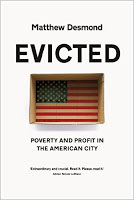 In a recent and impassioned review of Matthew Desmond's latest book, Evicted:Poverty and Profit in the American City, to be published shortly (on 1 March 2016, Crown Publishers), the New York Times wryly noted: "Poverty in America has become a lucrative business, with appalling results".
In a recent and impassioned review of Matthew Desmond's latest book, Evicted:Poverty and Profit in the American City, to be published shortly (on 1 March 2016, Crown Publishers), the New York Times wryly noted: "Poverty in America has become a lucrative business, with appalling results".
The author of the review is Barbara Ehrenreich, the noted political activist who was perhaps the first one to publish a best seller about the subject of poverty, Nickel and Dimed that came out in 2001.
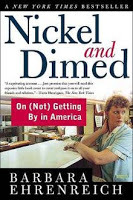 It caused a stir and inspired others to follow in her path, including Adam Shepard with Scratch Beginnings: Me, $25 and the Search for the American Dream and Charles Platt with his blog "Boing, Boing".
It caused a stir and inspired others to follow in her path, including Adam Shepard with Scratch Beginnings: Me, $25 and the Search for the American Dream and Charles Platt with his blog "Boing, Boing".
Ms. Ehrenreich is also the founder of the Economic Hardship Reporting Project (EHRP) dedicated to "supporting journalism, photo and video about economic struggle". EHRP is run by editor-in-chief Alissa Quart, a professor at Columbia University's School of Journalism and author of a socially-oriented non-fiction book Branded: the Buying and Selling of Teenagers .
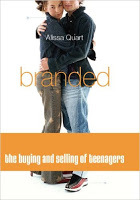 Published in 2003, it was considered a "substantive follow-up to Naomi Klein's No Logo" (Publishers' Weekly).
Published in 2003, it was considered a "substantive follow-up to Naomi Klein's No Logo" (Publishers' Weekly).
In 2012, Katherine Boo, a New Yorker journalist and recipient of a Pulitzer prize, erupted on this American scene focused with her best selling book about poverty in India, Behind the Beautiful Forevers: Life, Death and Hope in a Mumbai Slum .
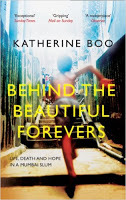 It instantly earned praise from everyone that counts (1,851 customer reviews on Amazon, over 8,000 reviews on Goodreads) and an accolade from best-selling author Junot Diaz on the New York Times, calling it "a book of extraordinary intelligence and humanity...beyond groundbreaking".
It instantly earned praise from everyone that counts (1,851 customer reviews on Amazon, over 8,000 reviews on Goodreads) and an accolade from best-selling author Junot Diaz on the New York Times, calling it "a book of extraordinary intelligence and humanity...beyond groundbreaking".
What have all these authors in common?
They all did something unusual...
Click here to read the rest.









It comes with the Thingser logo as a featured image to draw attention to this special feature:
 And here's the article:
And here's the article:POVERTY IN AMERICA vs. POVERTY IN INDIA: A JUICY SUBJECT FOR BESTSELLERS?
 Featured image on NYT review of Evicted, published February 26, 2016 A book about poverty, Evicted: Poverty and Profit in the American City, by Matthew Desmond, a sociologist and Harvard University professor and Co-director of the Justice and Poverty Project, was defined by the New York Times as "an astonishing book". Before going on sale on March 1, 2016, it had already 23 positive "customer reviews" on Amazon. The publisher, Crown Publishers, is ensuring this will be a smashing hit, including pricing the hardcover edition lower than the digital edition. The objective? Echo Katherine Boo's success with her 3-year study of a Mumbai slum. Here are the reasons why such a book, in spite of its dark, depressing content, is very likely to make it as a major best seller and perhaps even as a future blockbuster movie.
Featured image on NYT review of Evicted, published February 26, 2016 A book about poverty, Evicted: Poverty and Profit in the American City, by Matthew Desmond, a sociologist and Harvard University professor and Co-director of the Justice and Poverty Project, was defined by the New York Times as "an astonishing book". Before going on sale on March 1, 2016, it had already 23 positive "customer reviews" on Amazon. The publisher, Crown Publishers, is ensuring this will be a smashing hit, including pricing the hardcover edition lower than the digital edition. The objective? Echo Katherine Boo's success with her 3-year study of a Mumbai slum. Here are the reasons why such a book, in spite of its dark, depressing content, is very likely to make it as a major best seller and perhaps even as a future blockbuster movie.
 In a recent and impassioned review of Matthew Desmond's latest book, Evicted:Poverty and Profit in the American City, to be published shortly (on 1 March 2016, Crown Publishers), the New York Times wryly noted: "Poverty in America has become a lucrative business, with appalling results".
In a recent and impassioned review of Matthew Desmond's latest book, Evicted:Poverty and Profit in the American City, to be published shortly (on 1 March 2016, Crown Publishers), the New York Times wryly noted: "Poverty in America has become a lucrative business, with appalling results".The author of the review is Barbara Ehrenreich, the noted political activist who was perhaps the first one to publish a best seller about the subject of poverty, Nickel and Dimed that came out in 2001.
 It caused a stir and inspired others to follow in her path, including Adam Shepard with Scratch Beginnings: Me, $25 and the Search for the American Dream and Charles Platt with his blog "Boing, Boing".
It caused a stir and inspired others to follow in her path, including Adam Shepard with Scratch Beginnings: Me, $25 and the Search for the American Dream and Charles Platt with his blog "Boing, Boing". Ms. Ehrenreich is also the founder of the Economic Hardship Reporting Project (EHRP) dedicated to "supporting journalism, photo and video about economic struggle". EHRP is run by editor-in-chief Alissa Quart, a professor at Columbia University's School of Journalism and author of a socially-oriented non-fiction book Branded: the Buying and Selling of Teenagers .
 Published in 2003, it was considered a "substantive follow-up to Naomi Klein's No Logo" (Publishers' Weekly).
Published in 2003, it was considered a "substantive follow-up to Naomi Klein's No Logo" (Publishers' Weekly).In 2012, Katherine Boo, a New Yorker journalist and recipient of a Pulitzer prize, erupted on this American scene focused with her best selling book about poverty in India, Behind the Beautiful Forevers: Life, Death and Hope in a Mumbai Slum .
 It instantly earned praise from everyone that counts (1,851 customer reviews on Amazon, over 8,000 reviews on Goodreads) and an accolade from best-selling author Junot Diaz on the New York Times, calling it "a book of extraordinary intelligence and humanity...beyond groundbreaking".
It instantly earned praise from everyone that counts (1,851 customer reviews on Amazon, over 8,000 reviews on Goodreads) and an accolade from best-selling author Junot Diaz on the New York Times, calling it "a book of extraordinary intelligence and humanity...beyond groundbreaking". What have all these authors in common?
They all did something unusual...
Click here to read the rest.









Published on March 01, 2016 09:24
February 25, 2016
Writers: Don't be Afraid of Your Plot!
I was recently reminded how often a story doesn't go far enough, and as a result, it simply fails.
 The thought came to me as I watched a film last night on Netflix, Viaggio Sola (I Travel Alone or A Five Star Life), the work of writer/director Maria Sole Tognazzi (a rare woman director!) with a couple of friend writers (Francesca Marciano e Ivan Cotroneo) - all in their forties and unmarried.
The thought came to me as I watched a film last night on Netflix, Viaggio Sola (I Travel Alone or A Five Star Life), the work of writer/director Maria Sole Tognazzi (a rare woman director!) with a couple of friend writers (Francesca Marciano e Ivan Cotroneo) - all in their forties and unmarried.The film, done on a tiny budget and released in 2013, met with restrained praise abroad (here and here) and somewhat warmer praise at home, in Italy (here and here) . And it ended with a 6.3 rating on IMDB. Nothing earth-shaking but respectable.
Why was this film (and story) not a blockbuster?
It has a great premise: it's about a woman who works as an inspector, verifying the quality of five star hotels across the world - the film starts with the Crillon in Paris. She has chosen a life of freedom and luxury over marriage and family.
Big themes.
And they transcend gender: one could easily imagine a man doing her job. Would a man in the same circumstances - a job that requires high levels of business traveling - handle better his personal life? Maybe so, but this is a question Ms. Tognazzi doesn't address, her focus is on the woman.
And the film has impeccable photography and actors. If you haven't seen the film, here's the trailer, it gives a fair idea of the "tone" of the film:
The woman, Irene (played beautifully by Margherita Buy who won a David di Donatello award for it) is a little mature, even fanée and predictably very solitary, due to the nature of her work that constantly takes her away from her life partner (who, just as predictably, has an affair with another, more available woman - she doesn't travel - who eventually is expecting his child).
Irene accepts that the price of her life style is not having children but it grates on her; that glossy five star hotel life feels frozen, alienating - all the more so because in her job as an inspector she has to constantly size it up rather than enjoy it.
The film was streaming faultlessly, building to a climax when Irene meets Kate, a sister soul, as they both lounge lazily around in the luxury spa of a 5 star hotel in Berlin. Kate, equally fanée is a bitingly bright English anthropologist and amateur philosopher who suggests they leave behind the luxury world of their hotel and spend the evening together in a loud, raucous Turkish restaurant that she promises her will be full of real life - not the "deceit" of all this luxury.
So there you are, expecting fireworks at the Turkish restaurant, maybe a Turkish macho type will disrupt the evening, maybe the two women will end up in bed, maybe not (too soon? too cliché, more twists needed?).
But the next scene is a total surprise: Irene is not with her new friend Kate dining on exotic Turkish food; she's still in her luxury hotel, and she is apparently having her usual lonely breakfast among the crystal and porcelain, the chandeliers and the white linen.
What happened to Kate? Irene soon finds out she's dead, maybe from a heart attack, in any case it's unexpected. And that throws Irene in a spin, she starts questioning her life, she panics. The end (no spoilers given here) is excellent, with some humorous touches (again, no spoilers). But the film doesn't quite make it, it doesn't take on that added dimension needed for a blockbuster.
I'm totally convinced that if that scene at the Turkish restaurant - a scene we had been led to expect - had been played out, this film would be a classic today. A low-class, warm and human scene with perhaps "osé" sexual overtones would have carried the film onto another level, providing a much needed contrast to the frozen perfection of high-class luxury. Kate could still die her unexpected death and the film end the way it did, but it would have happened after that Turkish scene - and with the added bonus that for us, as viewers, we would have come to know Kate better and would have emotionally felt her death. As it is now, we don't really care that she died.
In other words, fellow writers, don't ever be afraid of carrying your ideas onto their logical end!









Published on February 25, 2016 04:42
February 23, 2016
The Western Sahara
Another one of my articles on Impakter magazine:

THE WESTERN SAHARA SCANDAL: THE FORGOTTEN EMERGENCYCLAUDE FORTHOMMEon February 22, 2016 at 5:25 PMThe Western Sahara scandal. The last colonial war in Africa is still unresolved, in spite of over 40 years of efforts on the part of the United Nations. A people has been destroyed, its rights to its native soil confiscated, half of its people living in refugee camps – three generations now that have never known a normal, free life – while the rest barely ekes out a living in the barren eastern part of the country, just beyond a Berlin-like wall built by the occupant, Morocco.And all the riches of the country from ocean fisheries and phosphate mining go to Morocco, leaving not a cent for the native people of the Western Sahara, the Sahrawis. [image error]The Berm divides the country: Morocco controls the area to the West, the Polisario to the East. Source: KmusserMorocco has brought into the country some 350,000 Moroccan immigrants; they help exploit the phosphate mines and have even set up modern agricultural infrastructures producing tomatoes, while the exploration rights to oil recently discovered in the ocean have been sold to Americans. The Moroccan tomatoes bought by Europeans are often in fact grown in the Western Sahara.Who knew?Actually, nobody knows. Or cares. This is an international scandal, one of the worst offenses against human rights and human dignity. And a conspicuous United Nations failure.How did it all start?To read the rest of the article, click here.You will see many comments there already and I signed the petition organized by a Swiss Committee to ask the UN Security Council to organize a referendum as soon as possible, to put a close to this scandal. Join me in signing for this good cause, here's the link: http://www.westernsahara-referendum.org/?section=2&lang=en




THE WESTERN SAHARA SCANDAL: THE FORGOTTEN EMERGENCYCLAUDE FORTHOMMEon February 22, 2016 at 5:25 PMThe Western Sahara scandal. The last colonial war in Africa is still unresolved, in spite of over 40 years of efforts on the part of the United Nations. A people has been destroyed, its rights to its native soil confiscated, half of its people living in refugee camps – three generations now that have never known a normal, free life – while the rest barely ekes out a living in the barren eastern part of the country, just beyond a Berlin-like wall built by the occupant, Morocco.And all the riches of the country from ocean fisheries and phosphate mining go to Morocco, leaving not a cent for the native people of the Western Sahara, the Sahrawis. [image error]The Berm divides the country: Morocco controls the area to the West, the Polisario to the East. Source: KmusserMorocco has brought into the country some 350,000 Moroccan immigrants; they help exploit the phosphate mines and have even set up modern agricultural infrastructures producing tomatoes, while the exploration rights to oil recently discovered in the ocean have been sold to Americans. The Moroccan tomatoes bought by Europeans are often in fact grown in the Western Sahara.Who knew?Actually, nobody knows. Or cares. This is an international scandal, one of the worst offenses against human rights and human dignity. And a conspicuous United Nations failure.How did it all start?To read the rest of the article, click here.You will see many comments there already and I signed the petition organized by a Swiss Committee to ask the UN Security Council to organize a referendum as soon as possible, to put a close to this scandal. Join me in signing for this good cause, here's the link: http://www.westernsahara-referendum.org/?section=2&lang=en



Published on February 23, 2016 03:52
February 8, 2016
Jenny Santi Reveals the Secret to Happiness
Another one of my articles just published on Impakter:

JENNY SANTI REVEALS THE SECRET TO HAPPINESSCLAUDE FORTHOMMEon February 1, 2016 at 5:00 PM
Jenny Santi, born and raised in the Philippines and now living in New York, has become something of a guru in the philanthropy community. When she was only twenty-eight, Santi headed for five years Philanthropy Services (Southeast Asia) for UBS, a Swiss global financial services company and the world’s largest wealth manager. Currently, a philanthropy adviser to some of the world’s most generous philanthropists, celebrity activists and foundations, she also shares her insights with the mainstream media, including recently with the New York Times, and has a new book out, “THE GIVING WAY TO HAPPINESS: Stories and Science Behind the Life-Changing Power of Giving” (Tarcher hardcover; published Oct 27, 2015) that is fast becoming a best seller on Amazon. She holds an MBA from INSEAD, went to the Wharton School as an exchange student, and attended New York University’s Heyman Center for Philanthropy and Fundraising, where she is a Chartered Adviser in Philanthropy.
In “THE GIVING WAY TO HAPPINESS,” Santi shares a growing body of scientific evidence that links giving with happiness, and helps the reader reflect on their own personal experiences in order to determine what and how to give. The book is filled with inspiring, personal stories of generosity that Santi has collected in interviews with, among others, Djimon Hounsou, Isabelle Allende, Goldie Hawn, Christy Turlington-Burns, Petra Nemcova, and Mo Ibrahim. For example, how supermodel Petra Nemcova overcame the tragedy she endured while vacationing in Thailand in December 2004 when her fiancé was swept away by the tsunami and never seen again while Petra broke her pelvis and was told she might never walk again; or how Joshua Williams who was only 5 years old when he started his foundation, turned into the “philanthro-prodigy” from Florida.
Impakter recently interviewed Jenny Santi and here are highlights of our conversation.
How did you come to the world of philanthropy, what were the events or people in your life that sparked your interest in charity work and giving? Jenny Santi: Kids don’t really say, “I want to be a philanthropy advisor when I grow up.” It’s such an unusual job in a nascent field. My journey to what I do now was not a straight line but a series of dots that I have only recently been able to connect. To read the rest of the interview, click here.
And if you have a minute, please help me with this "cover war" organized by Author Shout and vote for my book "Gateway to Forever", I'd be most grateful! The "war" is on all week till Sunday February 13, and you can come back and vote every day, that would be great, many thanks. Just click here, it will take you to the Author Shout website.










JENNY SANTI REVEALS THE SECRET TO HAPPINESSCLAUDE FORTHOMMEon February 1, 2016 at 5:00 PM
Jenny Santi, born and raised in the Philippines and now living in New York, has become something of a guru in the philanthropy community. When she was only twenty-eight, Santi headed for five years Philanthropy Services (Southeast Asia) for UBS, a Swiss global financial services company and the world’s largest wealth manager. Currently, a philanthropy adviser to some of the world’s most generous philanthropists, celebrity activists and foundations, she also shares her insights with the mainstream media, including recently with the New York Times, and has a new book out, “THE GIVING WAY TO HAPPINESS: Stories and Science Behind the Life-Changing Power of Giving” (Tarcher hardcover; published Oct 27, 2015) that is fast becoming a best seller on Amazon. She holds an MBA from INSEAD, went to the Wharton School as an exchange student, and attended New York University’s Heyman Center for Philanthropy and Fundraising, where she is a Chartered Adviser in Philanthropy.
In “THE GIVING WAY TO HAPPINESS,” Santi shares a growing body of scientific evidence that links giving with happiness, and helps the reader reflect on their own personal experiences in order to determine what and how to give. The book is filled with inspiring, personal stories of generosity that Santi has collected in interviews with, among others, Djimon Hounsou, Isabelle Allende, Goldie Hawn, Christy Turlington-Burns, Petra Nemcova, and Mo Ibrahim. For example, how supermodel Petra Nemcova overcame the tragedy she endured while vacationing in Thailand in December 2004 when her fiancé was swept away by the tsunami and never seen again while Petra broke her pelvis and was told she might never walk again; or how Joshua Williams who was only 5 years old when he started his foundation, turned into the “philanthro-prodigy” from Florida.
Impakter recently interviewed Jenny Santi and here are highlights of our conversation.
How did you come to the world of philanthropy, what were the events or people in your life that sparked your interest in charity work and giving? Jenny Santi: Kids don’t really say, “I want to be a philanthropy advisor when I grow up.” It’s such an unusual job in a nascent field. My journey to what I do now was not a straight line but a series of dots that I have only recently been able to connect. To read the rest of the interview, click here.
And if you have a minute, please help me with this "cover war" organized by Author Shout and vote for my book "Gateway to Forever", I'd be most grateful! The "war" is on all week till Sunday February 13, and you can come back and vote every day, that would be great, many thanks. Just click here, it will take you to the Author Shout website.









Published on February 08, 2016 16:11
February 1, 2016
Only 40 Self-Published Authors are a Success, says Amazon

The cat is out of the bag, finally we know exactly how many self-published authors make it big: 40.
Yes, that's not a typo.
40 self-published authors "make money", all the others, and they number in the hundreds of thousands, don't. This interesting statistic, recently revealed in a New York Times article, applies to the Kindle Store, but since Amazon is in fact the largest digital publishing platform in the world, it is a safe bet that self-published authors are not doing any better elsewhere.
"Making money" here means selling more than one million e-book copies in the last five years. Yes, 40 authors have managed that, and have even gone on to establishing their own publishing house, like Meredith Wild. Her story is fully reported in the New York Times, here, and well worth pondering over.
That story reveals some further nuggets about the current fluctuating state of the publishing industry: it seems that last year, a third of the 100 best-selling Kindle books were self-published titles on average each week. Conversely, that means legacy publishers only raked in two-thirds. Perhaps this is not such a surprising result, given their habit of pricing e-books at stratospheric levels, from $12 to $16 or more compared to self-published authors who deem that $3 to $5 is the "right" price...One has to wonder why publishers do this, even at times pricing e-books more than their own printed versions of the title. Perhaps they are afraid of digital?
The digital market is indeed scary, primarily because of its dimension: over 4 million titles today in the Kindle Store, compared with 600,000 six years ago (again, the data is from the same article). This means "book discovery" has become the number one problem. How can your book stand out in such a vast crowd?
There are many answers in the industry (and savvy marketing certainly has big role), but some of the more ground-breaking solutions come from the successful self-published authors themselves, like Meredith Wild and a few others that have (more or less) followed her example, like Bella Andre, Barbara Freethy, H.M.Ward, C.J.Lyons. They have struck deals with Ingram Content Group, a major book printer and distributor, thus getting their novels in bookstores, big-box stores and airports. Because,let's face it, when you're selling big in the digital market, you don't want to lose out in the printed one: 36% of book buyers still read only print books (according to a 2015 Codex Group survey - for more about how print books hold their own, see this article).
What does this mean in terms of the future of the industry? According to David Montgomery of Publishing Technology:
“There isn’t one book market anymore: there are two, and they exist in parallel. One continues to be dominated by major publishers, and increasingly uses agency pricing as a strategy to support print book sales. The second publishing market is almost exclusively made up of e-books, and is driven by Amazon-published and KDP content sold at a substantial discount to the product produced by traditional publishers.”
And he foresees a growing divide in 2016 between the two markets. Yet the success of Meredith Wild and the other authors like her suggests that something else might be happening: self-publishing could be encroaching in a territory that used to be seen as exclusive to legacy publishers.
Time to celebrate? Not yet. There is a caveat and it's a big one: only 40 such authors are likely to bridge the divide. In fact, writing is a poor man's occupation. As Publisher's Weekly noted in an article published last year: the majority of authors earn below the poverty line. The statistics are grim:
Given that a single person earning less than $11,670 annually sits below the poverty line, 56% of respondents would qualify, if they relied solely on income from their writing. The survey also indicated that not only are many authors earning little, they are, since 2009, also earning less. Overall, the median writing-related income among respondents dropped from $10,500 in 2009 to $8,000 2014 in 2014, a decline of 24%. (highlight added).That's way below the poverty line! Small wonder that most authors depend on another job to survive...
So if you're not selling your books, take heart, you're not the only one. If you're considering becoming a writer, think twice, it won't make you rich. To be honest, if I could do my life over, I wouldn't go into writing (though I love story-telling), I'd go into...film making! That is the art of the future, people don't read books, they go to the movies, they binge on TV series, they play video-games. And in all these - movies, TV, games - good story-tellers are more needed than ever...
No, the art of writing is not dead, it is just undergoing a change of venue!









Published on February 01, 2016 10:11
January 28, 2016
Tax Evasion: Why Not Follow the Irish Model?
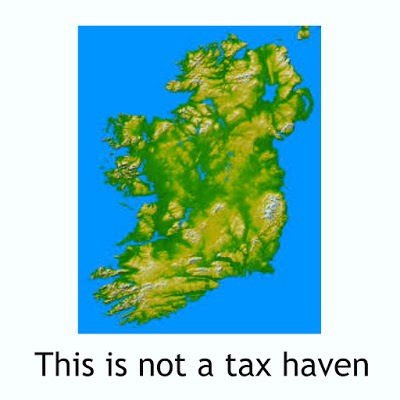
Europeans - and now Americans too - are all griping about Ireland, how it is a tax haven for big corporations seeking to shield their profits from fiscal authorities. Only a 12% levy! Neat, cool.
The latest "scandal" (if you will) is the Johnson Controls and Tyco deal: here we have a big American corporation divesting itself of its American nationality and happily becoming Irish...to avoid taxes of course. And needless to say, Johnson Controls is only the latest one joining the jolly band of tax evaders that include just about everyone in Fortune 500, from Microsoft to Coca-Cola, from Google to Amazon and Facebook.
Europeans are no less unhappy - ever since the Great Recession started, they haven't been able to bring Ireland to heel. No fiscal union here! Ireland got € billions of bailout money but it never agreed to (really) align its rates with the European Union. Not a bit. The Irish are Irish and don't care about the rest of Europe. They also know
I have a simple solution. It's based on the true and tried strategy of "if you can't beat 'em, join 'em".
Why doesn't every country in the EU align itself on the Irish tax rates? And the US too? Of course, the Irish might suddenly find that they're not a tax haven anymore - but so what? The more, the merrier. Everybody pays 12% (instead of 23% and more).
Ah, I can hear the objections, treasuries would go dry, budgets would collapse, states would go broke. Would they now? Are you sure? What about all the money that would be recovered from tax evasion? Billions and billions. In the UK alone, it is estimated that some £35 billions have been lost to the state through people not paying as much as they should. And the situation in the US is ten times as bad:
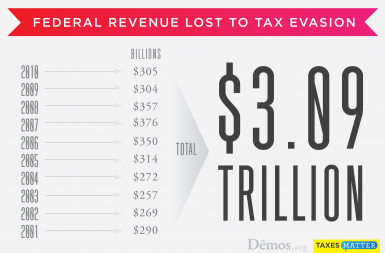
Now if tax rates were reasonable, the way they are in Ireland, people would start paying taxes, corporations would stop playing fiscal games (like the "tax inversion" one).
Why not try this simple recipe? But politicians, I'm afraid, hate innovation and
don't have that kind of courage...
Related articles [image error] John Kay on tax: so right, and so wrong [image error] Corporate tax initiative in Oregon: Letters to the Editor [image error] IRS Reveals That Microsoft Effectively Stole Tens of Billions of Dollars of Public Money Using a Network of Tax Havens [image error] Trade secrets: Coca-Cola's hidden formula for avoiding taxes









Published on January 28, 2016 12:33
January 26, 2016
Cool: You can Embed Your Book in Your Website or Share Directly!
I'm so excited by this discovery that I thought I'd share it with all of you! Amazon provides you with a real EASY way to embed your books in your website.
Here is the result:
See how clever? Not just the image of a book cover, but an inter-active icon that lets you read a preview of the book!
To do this, all you have to do is to go to the Amazon book page of your choice and go down to the "share" line on the right hand side, below the buy button. Click "embed", copy the URL or HTML code and paste it wherever you like, and you're done. Here are the Amazon explanations:

For more on how to do it, go here.
Happy reading!









Here is the result:
See how clever? Not just the image of a book cover, but an inter-active icon that lets you read a preview of the book!
To do this, all you have to do is to go to the Amazon book page of your choice and go down to the "share" line on the right hand side, below the buy button. Click "embed", copy the URL or HTML code and paste it wherever you like, and you're done. Here are the Amazon explanations:

For more on how to do it, go here.
Happy reading!









Published on January 26, 2016 00:31
January 10, 2016
2016: The Year of the Writer?
There are signs that after the dramatic 2009 digital disruption that brought in the self-publishing tsunami, the publishing industry is stabilizing. And Kristine Kathryn Rusch, a best-selling author and dispenser of cool, much sought-after advice has even decreed on her blog in a year-end post, that 2016, is going to be "The Year of the Writer".
 Kristine Kathryn Rush's blog, click here
Kristine Kathryn Rush's blog, click here
Hooray! Or is it too early to celebrate? KK Rusch notes that in 2015 a lot of indie writers suffered from burnout (disclosure: my case too). But she has words of wisdom to soothe the pain:
So why this high rate of burnout in 2015? Simple: because of marketing pressures:
You have to market your book in every possible way, Twitter, Facebook, book tours, Goodreads, you name it - exhausting;You have to write your next book in the series - yes, it's a series of course, the best way to keep your readers glued to your books - and you have to do it as fast as you can, you've heard that best-selling authors come out with a new book every three months (yikes, how do they manage that?) - even more exhausting, especially if coupled with (1) above.No surprise then that authors collapse.
But as KK Rush says, why do it? The solution to burnout is simple: write what you want. And, as she notes:
Well, maybe not quite yet. Also, there are many ways to deal with burnout. For example, you could step sideways - move into non-fiction. That's what I did: since 2014, I've moved into a lot of non-fiction writing (mostly articles about the United Nations) and working as Senior Editor for Impakter - and it's been a wonderful experience, I've come across a lot of new, hugely talented young writers contributing exciting articles to Impakter.
 Impakter - The United Nations section, click here to see.
Impakter - The United Nations section, click here to see.
Meanwhile the number of readers on Impakter has grown exponentially, to the extent that it has become a lead magazine for Millennials, even exceeding the New Yorker...That has made my experience with burnout as a fiction writer a lot easier to bear!
But KK Rush does not stop there in her predictions. She has just published a fascinating analysis of what went wrong: "Business Musings: The Reactive Business Model". What she is arguing is that traditional publishers, starting in the 1970s, have been "reacting" to surprise best-sellers by imitating them. In order to survive commercially, they've churned out as fast as they could books that are as close as possible to the surprise best seller. And now, indie writers have fallen in the same trap, writing in the genre that supposedly "sells", following as closely as they can the example set by best-selling authors. And you get a slew of would-be Hunger Games, slavishly applying what KK Rusch calls the "reactive business model". And she predicts:
I would only add: don't worry about marketing at all.
I know, this may sound counter-intuitive in a time when book discovery has become incredibly difficult given the large number of available titles - more than 4 million in the Kindle store alone.
The theory that the "cream rises to the top" and that the best books will be inevitably discovered has proved wrong time and again. A book, to be properly launched, needs strong marketing. A push. And of course, be ready to do it when the time comes but don't overdo it, and especially not at the expense of your writing time.
You can always do some more book promotion later, if and as needed. It may take longer for you to be recognized, but at least in this digital age, indie writers have an advantage over traditionally published authors of the past: their books don't disappear from book stores after three months, digital versions stay in the cloud forever, they have a so-called "long tail" that is (eventually) working for them.
This simple technical fact ensures that your books remain available on Amazon and other platforms as long as you, the author, don't retire them.
So hang on in there!
And Happy 2016!
Related articles [image error] Review of Discoverability [image error] Book distributor Ingram buys direct-to-consumer service Aer.io [image error] The Writer Aid blog is Moving On









 Kristine Kathryn Rush's blog, click here
Kristine Kathryn Rush's blog, click hereHooray! Or is it too early to celebrate? KK Rusch notes that in 2015 a lot of indie writers suffered from burnout (disclosure: my case too). But she has words of wisdom to soothe the pain:
If you’re destined to be a career writer, you’ll come back to it—or rather, it’ll come back to you. One day, a story will pop into your head, a story that needs to be told. I just got an e-mail from a long-time published writer who said that very thing. For the longest time, he thought he was done writing, and now he’s turning his attention to a new novel.So nice to hear I'm not the only one (and yes, now too I'm turning my attention to a new novel).
So why this high rate of burnout in 2015? Simple: because of marketing pressures:
You have to market your book in every possible way, Twitter, Facebook, book tours, Goodreads, you name it - exhausting;You have to write your next book in the series - yes, it's a series of course, the best way to keep your readers glued to your books - and you have to do it as fast as you can, you've heard that best-selling authors come out with a new book every three months (yikes, how do they manage that?) - even more exhausting, especially if coupled with (1) above.No surprise then that authors collapse.
But as KK Rush says, why do it? The solution to burnout is simple: write what you want. And, as she notes:
It does take courage to write what you want. To follow your own creativity and see where it will lead you. To walk down a path that doesn’t exist yet.So maybe I should modify my conclusion and call 2016 the Year of the Courageous Writer. Because we’ll be seeing a lot of courage in print this year.Ready to be courageous? Ready to do your own thing?
Well, maybe not quite yet. Also, there are many ways to deal with burnout. For example, you could step sideways - move into non-fiction. That's what I did: since 2014, I've moved into a lot of non-fiction writing (mostly articles about the United Nations) and working as Senior Editor for Impakter - and it's been a wonderful experience, I've come across a lot of new, hugely talented young writers contributing exciting articles to Impakter.
 Impakter - The United Nations section, click here to see.
Impakter - The United Nations section, click here to see.Meanwhile the number of readers on Impakter has grown exponentially, to the extent that it has become a lead magazine for Millennials, even exceeding the New Yorker...That has made my experience with burnout as a fiction writer a lot easier to bear!
But KK Rush does not stop there in her predictions. She has just published a fascinating analysis of what went wrong: "Business Musings: The Reactive Business Model". What she is arguing is that traditional publishers, starting in the 1970s, have been "reacting" to surprise best-sellers by imitating them. In order to survive commercially, they've churned out as fast as they could books that are as close as possible to the surprise best seller. And now, indie writers have fallen in the same trap, writing in the genre that supposedly "sells", following as closely as they can the example set by best-selling authors. And you get a slew of would-be Hunger Games, slavishly applying what KK Rusch calls the "reactive business model". And she predicts:
And of course, the "old model" - the reason writers abandoned traditional publishing and went down the road of self-publishing in the first place - is exactly that:
More and more indie writers will leave the business if their business plan is based on the Reactive Business Model.Traditional publishers have forgotten that they used to partner with writers. Writers created the material and publishers published it to the best of their abilities. Because traditional publishers are owned by large corporate entities, the pursuit of profit has become the mantra, and if an imprint isn’t profitable in the short term (five years or so), it gets absorbed, replaced, or dissolved.
Indie writers don’t have to follow that model—and shouldn’t. They need to go back to the old model.
Write what you want to write. Don’t think about marketing until the project—whatever it is—is done. Then consider how to market the project. Be creative in the marketing too. Don’t just imitate what was done before.Wise words, no doubt about it. And when writing your next book, she warns:
"Don’t act like traditional publishers and manipulate your next book to be like someone else’s success. [...] Move forward in your career. Don’t look back. Following the Reactive Business Model is by definition looking backwards.Definitely good advice.
I would only add: don't worry about marketing at all.
I know, this may sound counter-intuitive in a time when book discovery has become incredibly difficult given the large number of available titles - more than 4 million in the Kindle store alone.
The theory that the "cream rises to the top" and that the best books will be inevitably discovered has proved wrong time and again. A book, to be properly launched, needs strong marketing. A push. And of course, be ready to do it when the time comes but don't overdo it, and especially not at the expense of your writing time.
You can always do some more book promotion later, if and as needed. It may take longer for you to be recognized, but at least in this digital age, indie writers have an advantage over traditionally published authors of the past: their books don't disappear from book stores after three months, digital versions stay in the cloud forever, they have a so-called "long tail" that is (eventually) working for them.
This simple technical fact ensures that your books remain available on Amazon and other platforms as long as you, the author, don't retire them.
So hang on in there!
And Happy 2016!
Related articles [image error] Review of Discoverability [image error] Book distributor Ingram buys direct-to-consumer service Aer.io [image error] The Writer Aid blog is Moving On









Published on January 10, 2016 08:15



